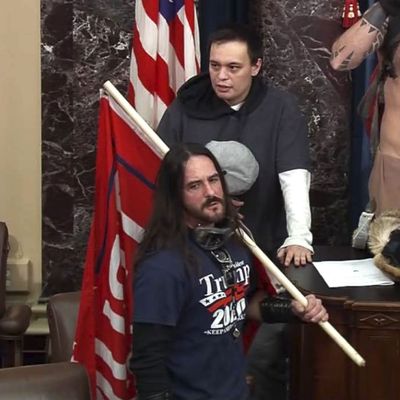
Six months and 13 days after a mob of Trump supporters broke into the Capitol threatening to hang the vice-president, injuring more than 140 law enforcement officers, and causing more than $30 million in damages, the first insurrectionist has been sentenced to prison time.
Paul Hodgkins received an eight-month sentence on Monday after pleading guilty last month to a felony count of obstructing congressional proceedings when he and several hundred others disrupted lawmakers attempting to certify Joe Biden’s election victory. Videos show Hodgkins wearing a Trump shirt while breaking into the Senate chamber, where he remained for 15 minutes and flew a Trump flag by the dais. “The symbolism of that act is unmistakable,” D.C. District Judge Randolph Moss said on Monday. “In that act, he captured the threat to democracy that we all witnessed that day.”
While federal prosecutors had sought an 18-month sentence for Hodgkins, Moss did not heed their recommendation because Hodgkins pleaded guilty “exceptionally early,” was not directly involved in violence, and offered a “sincere” apology. “I can say without a shadow of a doubt that I am truly remorseful and regretful for my actions,” Hodgkins told the court, adding he came to D.C. “with the intention of supporting a president I love” and that “the storming of the U.S. Capitol building was not something I had any idea would happen.” In court, Hodgkins also admitted that Biden was “rightfully” elected president.
Out of close to 550 rioters charged in the past six months, a little more than half are facing obstruction-of-Congress felonies. Though prosectors have not yet pursued sedition charges, they reportedly considered doing so in the early days of the investigation, Assistant U.S. Attorney Mona Sedky argued on Monday that Hodgkins was “part and parcel of an act of domestic terrorism that was going on around him.” Because Hodgkins was the first felony sentencing — two misdemeanors have already been handed out — prosecutors and defense attorneys have been awaiting the sentence “as a benchmark for hundreds of other Capitol riot cases and as a potential aid to plea negotiations that have been handicapped by a lack of guideposts to what defendants can expect if they accept plea bargains from prosecutors,” notes Politico. Federal law requires the 20 judges involved in Capitol- nriot cases to “avoid unwarranted sentence disparities among defendants with similar records who have been found guilty of similar conduct.”
As judges consider the 550 or so cases already in process, the FBI is still looking for around 300 suspects involved in the Capitol riot, according to an AP analysis earlier this month. Several of these unnamed insurrectionists appear to be some of the day’s most violent and organized actors, including suspects who assaulted officers with batons and flag poles and the person who placed pipe bombs outside the offices of the Republican and Democratic national headquarters.






























